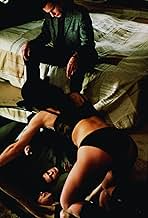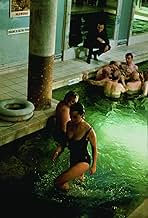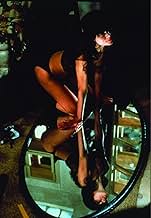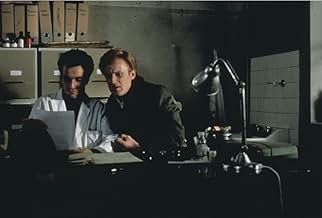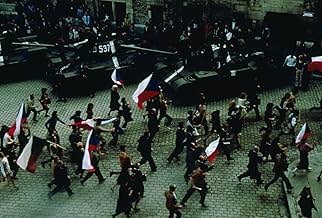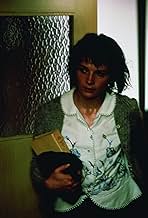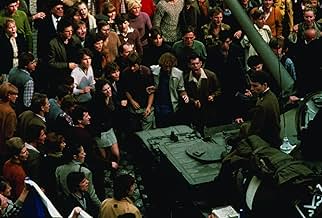CALIFICACIÓN DE IMDb
7.2/10
40 k
TU CALIFICACIÓN
En 1968, un médico checo con una vida sexual muy activa conoce a una mujer monógama poco antes de que la invasión soviética interrumpa sus vidas.En 1968, un médico checo con una vida sexual muy activa conoce a una mujer monógama poco antes de que la invasión soviética interrumpa sus vidas.En 1968, un médico checo con una vida sexual muy activa conoce a una mujer monógama poco antes de que la invasión soviética interrumpa sus vidas.
- Dirección
- Guionistas
- Elenco
- Nominado a 2 premios Óscar
- 7 premios ganados y 14 nominaciones en total
Pavel Landovský
- Pavel
- (as Pavel Landovsky)
Stellan Skarsgård
- The Engineer
- (as Stellan Skarsgard)
Tomasz Borkowy
- Jiri
- (as Tomek Bork)
Pavel Slabý
- Pavel's Nephew
- (as Pavel Slaby)
László Szabó
- Russian Interrogator
- (as Laszlo Szabo)
- Dirección
- Guionistas
- Todo el elenco y el equipo
- Producción, taquilla y más en IMDbPro
Opiniones destacadas
for the courage to adapt the Kundera novel. and for science to not be only an adaptation. for superb acting and for care to details - the black umbrellas is only an example. for delicate poetry of images and for inspired use of politic frame for reflect the nuances of lead characters. and for the message who, for a viewer from East Europe , has a fundamental sound. because is more than a story about choices, forms of love, fragility and need of the other, roots of freedom and pure joy in a dark universe. it is a perfect reflection to remember the web of past as embroidery of life crumbs. and admire the admirable manner of actors to give life to the characters shadows and lights.
Imagine you're at the theater attending a live performance, a truly living performance in which both axioms and mythological truths are entered into and shared by actors and audience alike. Now suppose that the backdrop for all the action is dark, oppressive, and heavy, while all that transpires before it is light, glib, and ineffectual. Now consider that, through the course of the play, all that is bouncy and trivial becomes overwhelmed and absorbed by the gravity of the background, like light being sucked into the gravity of a black hole, so that what was once meaningless and unimportant and even silly becomes increasingly momentous and important and valuable as the play progresses. If you can see this outline in your mind's eye, you have a good idea about The Unbearable Lightness of Being, Milan Kundera's novel by the same name brought to life as a movie. The film, like the novel, declares one thing: `only necessity is heavy, and only what is heavy has value.' I so love this idea, this earth shattering insight: it effortlessly capsizes our Postmodern zeitgeist in one innocuous little phrase. And the film expresses it beautifully.
Set in the Prague Spring of 1968, when the Soviets put down Dubcek's `Socialism with a Human Face,' the weight of these events draws the lives of a Czech doctor, his wife, and his lovers, into its orbit. And instead of crushing them, as one might assume, it becomes the fire that purifies gold. Tomas (Daniel Day-Lewis), for example, had previously written a treatise on Oedipus, a witty exercise in sophistry aimed at the Communist regime as a provocative analogy, nothing more. But as the essay becomes an object of obsession to the Communists, we see Kundera's definition of vertigo come into play. It is not the fear of falling, but the soul's defense against the desire to fall. Tomas wanted to fall. Why? Watch the movie, and find out for yourself.
Set in the Prague Spring of 1968, when the Soviets put down Dubcek's `Socialism with a Human Face,' the weight of these events draws the lives of a Czech doctor, his wife, and his lovers, into its orbit. And instead of crushing them, as one might assume, it becomes the fire that purifies gold. Tomas (Daniel Day-Lewis), for example, had previously written a treatise on Oedipus, a witty exercise in sophistry aimed at the Communist regime as a provocative analogy, nothing more. But as the essay becomes an object of obsession to the Communists, we see Kundera's definition of vertigo come into play. It is not the fear of falling, but the soul's defense against the desire to fall. Tomas wanted to fall. Why? Watch the movie, and find out for yourself.
It's 1968 Prague. Tomas (Daniel Day-Lewis) is a womanizing doctor. His often-lover Sabina (Lena Olin) is a liberated sophisticated woman. At a country spa, Tomas is taken with local girl Tereza (Juliette Binoche). He sets free the mousy Tereza and they have a passionate affair along with Sabina. Tomas and Tereza get married but jealousy overwhelms her. Then the Prague Spring erupts.
There has been many threesomes in cinematic history. The acting power in these three is one of best. Daniel is able to make the charismatic cad likable. Lena is sexual dynamite. Juliette is pure magic in this one. It is a great threesome against the backdrop of compelling political turmoil.
There has been many threesomes in cinematic history. The acting power in these three is one of best. Daniel is able to make the charismatic cad likable. Lena is sexual dynamite. Juliette is pure magic in this one. It is a great threesome against the backdrop of compelling political turmoil.
The Unbearable Lightness of Being (1988)
I liked this book a lot, and I like director Philip Kaufman's approach to movies. The best of this movie is terrific, as well: the wild culture of personal and cultural freedom at the start, the chilling invasion of Soviet tanks in the center, and the last half hour of idealized romance and happiness in the country.
That kind of gives away the movie, it would seem. But in a way, the movie is about how all these things happen. This is where it gets to be about taste and patience. It's a long movie, and much of the events are not really a development of plot, but a steady continuation of a variety of relationships (mainly between the lead man and the two main women). There is a plot behind all this, especially around their leaving Czechoslovakia and then finding a return to bliss in the Czech countryside, but this doesn't drive the movie overall.
For me, it wasn't enough to see these people enjoying sex and discovering conflicts between the three legs of the love triangle. Scenes were often leisurely in a way that implies we were glad to just be there and watch things happen within a pocket of frozen time, rather than through time. By that I mean, it wasn't where you were going with the emotional aspects, but it was where you were, the now of the interactions. The might actually be where the book was so successful--it created moods and scenes where you were, actually, glad to just be absorbed. For me, that wasn't always the case in the film version.
Part of the problem might just be Daniel Day Lewis, who is a bit too self-satisfied, not as a character (that is certain) but as an actor. He lacks the magnetism that might sustain the unlikely and ongoing love the two women have for him, even as they know about each other. On the other hand, it's a huge, epic tale about true freedom, and a very real pursuit of happiness. And when the energy gets going, and the mood is fully expanded, there is magic. Especially, again, at the end, including the famous fade to white in the last frames, it is about a kind of heaven on earth. Who can object to that?
I liked this book a lot, and I like director Philip Kaufman's approach to movies. The best of this movie is terrific, as well: the wild culture of personal and cultural freedom at the start, the chilling invasion of Soviet tanks in the center, and the last half hour of idealized romance and happiness in the country.
That kind of gives away the movie, it would seem. But in a way, the movie is about how all these things happen. This is where it gets to be about taste and patience. It's a long movie, and much of the events are not really a development of plot, but a steady continuation of a variety of relationships (mainly between the lead man and the two main women). There is a plot behind all this, especially around their leaving Czechoslovakia and then finding a return to bliss in the Czech countryside, but this doesn't drive the movie overall.
For me, it wasn't enough to see these people enjoying sex and discovering conflicts between the three legs of the love triangle. Scenes were often leisurely in a way that implies we were glad to just be there and watch things happen within a pocket of frozen time, rather than through time. By that I mean, it wasn't where you were going with the emotional aspects, but it was where you were, the now of the interactions. The might actually be where the book was so successful--it created moods and scenes where you were, actually, glad to just be absorbed. For me, that wasn't always the case in the film version.
Part of the problem might just be Daniel Day Lewis, who is a bit too self-satisfied, not as a character (that is certain) but as an actor. He lacks the magnetism that might sustain the unlikely and ongoing love the two women have for him, even as they know about each other. On the other hand, it's a huge, epic tale about true freedom, and a very real pursuit of happiness. And when the energy gets going, and the mood is fully expanded, there is magic. Especially, again, at the end, including the famous fade to white in the last frames, it is about a kind of heaven on earth. Who can object to that?
I would have to disagree with the previous reviewer. First of all, the movie should have a "euro" feel to it because it's about Europeans, in Europe, and their European mentality. No car chases here, hot shot. That being said, I only have great praise for this film. It's a tremendous attempt to put to screen the subtle understanding Milan Kundera has of the human condition, and it surprisingly succeeds. For those more interested, I recommend you pick up some of his novels (start with a short story if you are pressed for time) and you, too, will realize why he is one of the best storytellers alive today.
¿Sabías que…?
- TriviaThe first cut shown to the studio was under two hours in length and the story was confusing. Philip Kaufman was asked to add in scenes he cut. The next day they were shown the theatrically released version. It's believed Kaufman showed them a shorter and confusing version in order to get his almost three-hour final cut approved with no questions of cutting it.
- ErroresMephisto the Pig, consistently referred to as "he", is a sow, as can be seen frequently, but particularly when the group enters the inn for dancing.
Selecciones populares
Inicia sesión para calificar y agrega a la lista de videos para obtener recomendaciones personalizadas
- How long is The Unbearable Lightness of Being?Con tecnología de Alexa
Detalles
- Fecha de lanzamiento
- País de origen
- Sitios oficiales
- Idiomas
- También se conoce como
- The Unbearable Lightness of Being
- Locaciones de filmación
- Praga, República Checa(archive footage)
- Productora
- Ver más créditos de la compañía en IMDbPro
Taquilla
- Presupuesto
- USD 17,000,000 (estimado)
- Total en EE. UU. y Canadá
- USD 10,006,806
- Fin de semana de estreno en EE. UU. y Canadá
- USD 202,189
- 7 feb 1988
- Total a nivel mundial
- USD 10,006,806
- Tiempo de ejecución2 horas 51 minutos
- Color
- Mezcla de sonido
- Relación de aspecto
- 1.85 : 1
Contribuir a esta página
Sugiere una edición o agrega el contenido que falta

Principales brechas de datos
What is the Hindi language plot outline for La insoportable levedad del ser (1988)?
Responda

